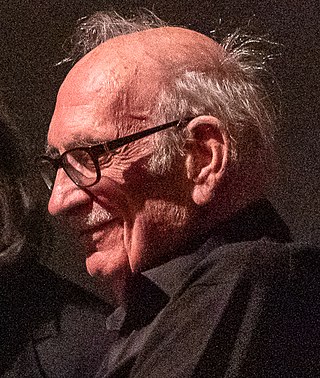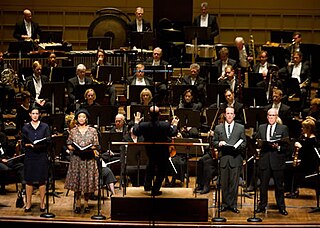Related Research Articles

The Pulitzer Prize for Music is one of seven Pulitzer Prizes awarded annually in Letters, Drama, and Music. It was first given in 1943. Joseph Pulitzer arranged for a music scholarship to be awarded each year, and this was eventually converted into a prize: "For a distinguished musical composition of significant dimension by an American that has had its first performance in the United States during the year."
Ellen Taaffe Zwilich is an American composer, the first female composer to win the Pulitzer Prize for Music. Her early works are marked by atonal exploration, but by the late 1980s, she had shifted to a postmodernist, neoromantic style. She has been called "one of America's most frequently played and genuinely popular living composers." She was a 1994 inductee into the Florida Artists Hall of Fame. Zwilich has served as the Francis Eppes Distinguished Professor at Florida State University.

George Henry Crumb Jr. was an American composer of avant-garde contemporary classical music. Early in his life he rejected the widespread modernist usage of serialism, developing a highly personal musical language which "range[s] in mood from peaceful to nightmarish". Crumb's compositions are known for pushing the limits of technical prowess by way of frequent use of extended techniques. The unusual timbres he employs evoke a surrealist atmosphere which portray emotions of considerable intensity with vast and sometimes haunting soundscapes. His few large-scale works include Echoes of Time and the River (1967), which won the 1968 Pulitzer Prize for Music, and Star-Child (1977), which won the 2001 Grammy Award for Best Contemporary Classical Composition; however, his output consists of mostly music for chamber ensembles or solo instrumentalists. Among his best known compositions are Black Angels (1970), a striking commentary on the Vietnam War for electric string quartet; Ancient Voices of Children (1970) for a mixed chamber ensemble; and Vox Balaenae (1971), a musical evocation of the humpback whale, for electric flute, electric cello, and amplified piano.
Shulamit Ran is an Israeli-American composer. She moved from Israel to New York City at 14, as a scholarship student at the Mannes College of Music. Her Symphony (1990) won her the Pulitzer Prize for Music. In this regard, she was the second woman to win the Pulitzer Prize for Music, the first being Ellen Taaffe Zwilich in 1983. Ran was a professor of music composition at the University of Chicago from 1973 to 2015. She has performed as a pianist in Israel, Europe and the U.S., and her compositional works have been performed worldwide by a wide array of orchestras and chamber groups.
Alfred Whitford (Fred) Lerdahl is the Fritz Reiner Professor Emeritus of Musical Composition at Columbia University, and a composer and music theorist best known for his work on musical grammar and cognition, rhythmic theory, pitch space, and cognitive constraints on compositional systems. He has written many orchestral and chamber works, three of which were finalists for the Pulitzer Prize for Music: Time after Time in 2001, String Quartet No. 3 in 2010, and Arches in 2011.

Steven Edward Stucky was a Pulitzer Prize-winning American composer.
Richard Wernick is an American composer. He is best known for his chamber and vocal works. His composition Visions of Terror and Wonder won the 1977 Pulitzer Prize for Music.
Melinda Jane Wagner is a US composer, and winner of the 1999 Pulitzer Prize in music. Her undergraduate degree is from Hamilton College. She received her graduates degrees from University of Chicago and University of Pennsylvania. She also served as Composer-in-Residence at the University of Texas (Austin) and at the 'Bravo!' Vail Valley Music Festival. Some of her teachers included Richard Wernick, George Crumb, Shulamit Ran, and Jay Reise.
Joseph Clyde Schwantner is a Pulitzer Prize-winning American composer, educator and a member of the American Academy of Arts and Letters since 2002. He was awarded the 1970 Charles Ives Prize.
Derek Bermel is an American composer, clarinetist and conductor whose music blends various facets of world music, funk and jazz with largely classical performing forces and musical vocabulary. He is the recipient of various awards including a Guggenheim Fellowship and the American Academy in Rome's Rome Prize awarded to artists for a year-long residency in Rome.
Christopher Chapman Rouse III was an American composer. Though he wrote for various ensembles, Rouse is primarily known for his orchestral compositions, including a Requiem, a dozen concertos, and six symphonies. His work received numerous accolades, including the Kennedy Center Friedheim Award, the Grammy Award for Best Classical Contemporary Composition, and the Pulitzer Prize for Music. He also served as the composer-in-residence for the New York Philharmonic from 2012 to 2015.
Wayne Peterson was an American composer, pianist, and educator. He won the Pulitzer Prize for Music for The Face of the Night, the Heart of the Dark in 1992, when its board overturned the jury's unanimous selection of Concerto Fantastique by Ralph Shapey.
The following are the Pulitzer Prizes for 1968.
Merrill Leroy Ellis was an American composer, performer, and experimental music researcher. He is most known for his work with electronic (analog) and intermedia compositions, new compositional techniques, development of new instruments, and exploration of new notation techniques for scoring and performance.
The Second Concerto for Orchestra is a concerto for orchestra by the American composer Steven Stucky. The work was commissioned by the Los Angeles Philharmonic while Stucky was their composer-in-residence for the inaugural season of the Walt Disney Concert Hall. It was completed in 2003 and was first performed on March 12, 2004, with the conductor Esa-Pekka Salonen leading the Los Angeles Philharmonic. The piece was awarded the 2005 Pulitzer Prize for Music.
Astral Canticle is a double concerto for violin, flute, and orchestra by the American composer Augusta Read Thomas. The work was Thomas's sixth and final commission by the Chicago Symphony Orchestra before she concluded her nine-year tenure there as composer-in-residence. It was first performed in Chicago on June 1, 2006, by the flutist Mathieu Dufour, the violinist Robert Chen, and the Chicago Symphony Orchestra under the conductor Daniel Barenboim. The piece is dedicated to Barenboim and the Chicago Symphony Orchestra. The composition was a finalist for the 2007 Pulitzer Prize for Music.
Dialogues is a composition for solo piano and chamber orchestra by the American composer Elliott Carter. The work was commissioned by the BBC for the pianist Nicolas Hodges and completed in 2003. It was first performed on January 23, 2004 at the Queen Elizabeth Hall in Southbank Centre, London, by Nicolas Hodges and the London Sinfonietta under the conductor Oliver Knussen. The piece was a finalist for the 2005 Pulitzer Prize for Music. In 2012, Carter composed a followup to the piece Dialogues II for the conductor Daniel Barenboim's 70th birthday.
The Symphonia: sum fluxae pretium spei is an orchestral triptych by the American composer Elliott Carter. Its three movements were composed between 1993 and 1995. The complete work was first performed on April 25, 1998 at Bridgewater Hall, Manchester by the BBC Symphony Orchestra under the conductor Oliver Knussen. The second movement "Adagio tenebroso" was a finalist for the 1996 Pulitzer Prize for Music.
The Microsymphony is a single-movement composition for orchestra by the American composer Charles Wuorinen. The work was commissioned by the Philadelphia Orchestra and was completed in 1992. The piece was a finalist for the 1994 Pulitzer Prize for Music.
The Concerto for String Quartet and Orchestra is a composition for string quartet and orchestra by the American composer Gunther Schuller. The work was composed between 1987 and early 1988. Its world premiere was given on February 20, 1988, by the Pro Arte Quartet and the Madison Symphony Orchestra conducted by Schuller. The piece was a finalist for the 1988 Pulitzer Prize for Music.
References
- ↑ Fischer, Heinz Dietrich, ed. (2010). The Pulitzer Prize Winners for Music: Composer Biographies, Premiere Programs and Jury Reports. Peter Lang. pp. 115–117. ISBN 978-3631596081.
- 1 2 Crumb, George (1967). "Echoes of Time and the River (Echoes II)". G. Schirmer Inc. Retrieved July 29, 2017.